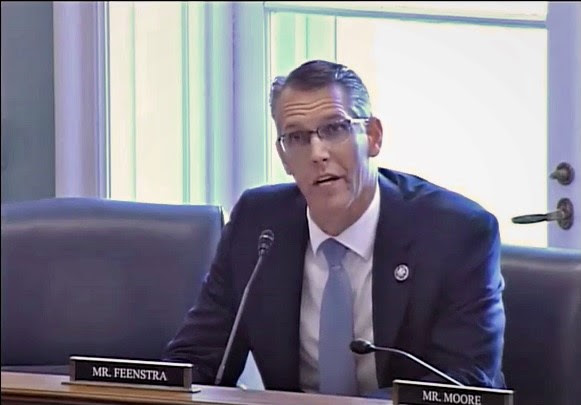Feenstra Introduces Legislation to Modernize Surveillance and Reporting Mechanisms for Foreign Acquisition of American Farmland

U.S. Reps. Randy Feenstra (R-IA) and Elissa Slotkin (D-MI) introduced the Foreign Agricultural Restrictions to Maintain Local Agriculture and National Defense (FARMLAND) Act.
This legislation would authorize the Committee on Foreign Investment in the United States (CFIUS) to review all purchases or leases of American farmland by foreign entities that exceed $5,000,000 or 320 acres and require the Secretary of Agriculture and the Secretary of Homeland Security to publish an annual report outlining any threats or national security risks of foreign investment in American farmland. It would also direct the Secretary of Agriculture to develop a public database of all farmland owned by foreign governments and other entities, and limit foreign-owned or operated land from participating in Farm Service Agency programs like the commodity programs.
“For far too long, our government has not administered the laws on the books to protect American farmland from acquisition by our foreign adversaries. If we fail to actively monitor foreign purchases of our farmland, we jeopardize our national, economic, energy, and food security. As a strong advocate for stopping our adversaries – like China – from buying our farmland, I am proud to introduce the FARMLAND Act, which will develop new oversight measures for foreign farmland purchases, require the Secretary of Agriculture to report the threats of foreign acquisition of American farmland to Congress, and punish foreign investors who fail to disclose farmland purchases,” said Rep. Feenstra. “With almost 50% of farmland expected to change hands in the next two decades, it is vital that we monitor and track any foreign entity buying large amounts of our farmland. Born and raised in rural Iowa, I firmly believe that American farmland belongs to American farmers, and I will continue to lead the fight to protect our farmers and rural communities.”
“Food security is national security, which means we cannot allow strategic competitors like China to gain control of the agricultural land that feeds us,” said Rep. Slotkin. “This legislation will help ensure our agricultural land does not come under the control of the Chinese Communist Party or other bad actors who might seek to use that control against us. I’m grateful for the leadership of Chairwoman Stabenow and Sen. Ernst on this bill in the Senate and hope to see this legislation as part of the 2023 Farm Bill.”
Under current law, the Agricultural Foreign Investment Disclosure Act (AFIDA) requires foreign investors who acquire, transfer, or hold any interest in American farmland to report holdings and transactions to the Secretary of Agriculture. However, enforcement of AFIDA has been virtually nonexistent as federal agencies do not enjoy explicit investigative power. To highlight the lack of oversight, China’s ownership of American farmland increased by 30% between 2019 and 2020 alone, and we’ve seen purchases mere miles from sensitive military sites.
Additionally, as of September 2022, the U.S. Department of Agriculture had only assessed eight financial penalties against foreign investors since 2012.
Earlier this year, Feenstra’s Defend America’s Rural Energy Act – which bans China from buying American farmland suitable for ethanol and biodiesel production – passed the U.S. House of Representatives by a margin of 407 to 26.
Feenstra also recently led a forum hosted by the Congressional Western Caucus – which is the largest Republican caucus on Capitol Hill that advocates for rural America – about the dangers that the Chinese Communist Party poses to the United States, our economy, our agriculture industry, and our food security at large. Representing the second largest agriculture-producing district in the country, defending American farmland from foreign land grabs remains a major priority for Feenstra.
You can find legislative text of the FARMLAND Act HERE.




